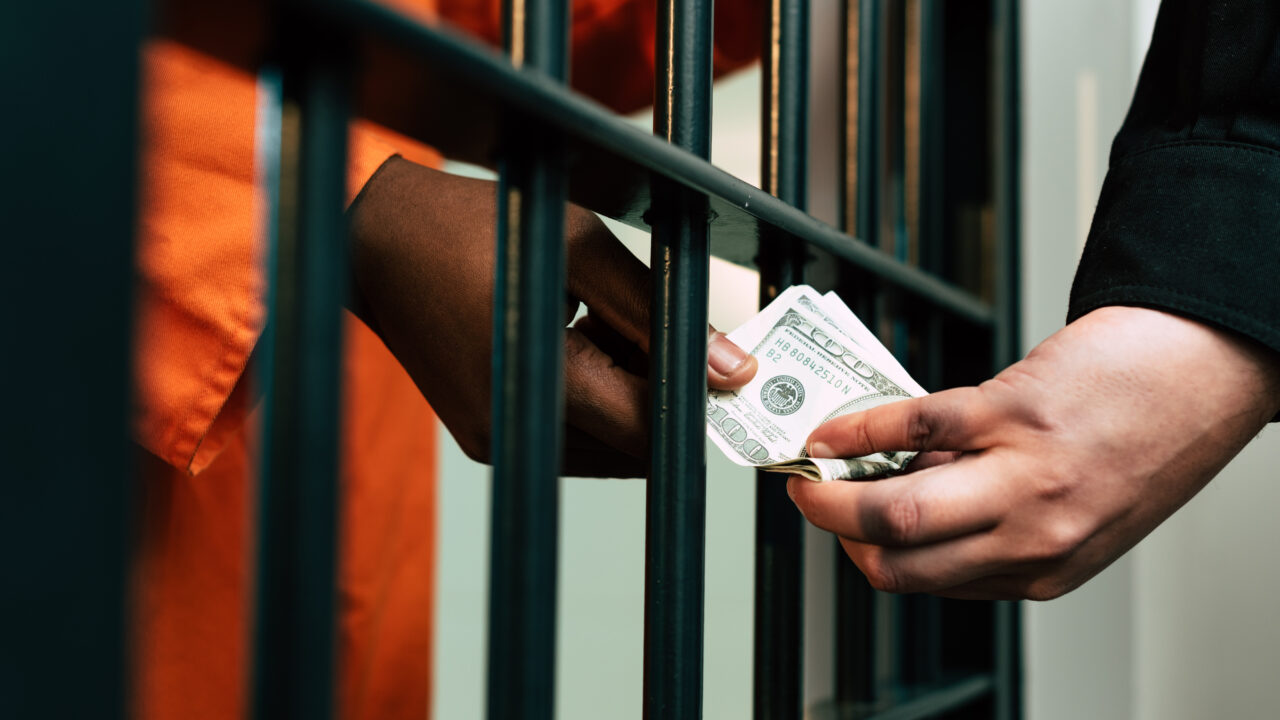Incarceration Is Financial Extraction
An abolitionist organizer discusses how bail, fines, and fees in the carceral system drive entire families into poverty. Adobe Images
Adobe Images
Where I come from in El Salvador, there is no cement paved road, no sidewalk. My grandfather’s house is a mile walk from a tiny village, nestled on the side of a mountain and surrounded by dirt paths full of jagged rocks. Everywhere, there are trees and luscious greenery.
It’s different from where I live now in South Central, Los Angeles. We’ve lived in the exact same apartment since my parents moved to South Central in the ’90s. Everywhere you look, there’s black asphalt and gray pavement. It’s almost always dirty. It feels like a cage. I didn’t understand this until I left South Central for the first time. I didn’t know people lived without metal guardrails on their windows or left their doors unlocked. I didn’t know some kids lived without metal detectors at their school or without police officers harassing them every day.
The criminalization of Black and brown people doesn’t stop at the school-to-prison pipeline, which, through carceral policies, leads students into mass incarceration and, very frequently, debt. Everywhere you go, you feel as though you’re not supposed to be there. My apartment complex recently built a metal gate out front that resembles my high school’s gate; both are 10 feet high. My home feels like a prison. Most of my friends have had incarcerated loved ones, and we all knew somebody in prison. I was livid when I learned the U.S. has the highest per capita incarceration rate of any country in the world. Million Dollar Hoods, a UCLA project that maps and documents the cost of incarceration, conducted a detailed analysis of zip codes in LA. Of all the places I could have grown up, I was raised on the border between two of the city’s most incarcerated communities.
If you don’t have money, you still have to find some way to survive, right? Poverty itself is criminalized, and poverty drives people to commit crime, but a criminal conviction only increases economic barriers. When I was hired as a carceral organizer at The Debt Collective in 2021, I decided to follow the money. We organize around many debt types, but my goal is to use carceral debt as leverage to weaken the prison-industrial complex. The strategy is to starve the industries that extract billions from already impoverished communities like South Central.
I ultimately became an abolitionist organizer because I no longer wanted to live in fear.
Specifically, my comrades and I decided to target bail debt. Far too many people—especially and overwhelmingly Black and brown people—are trapped in jail without even being convicted of a crime. Often, the charges brought against them are trumped up. Bail companies cash in on this. A bail bond agent can charge up to 10% of a person’s bail, so if someone is charged $100,000 for bail, the bondsman can charge them $10,000. Most people don’t have that kind of money. New survey data shows that only 1 in 3 Americans can afford to cover a $400 emergency expense.
It’s no coincidence that 67% of California’s jail population is pretrial. People who own their homes or cars will sometimes put them up as collateral to avoid sitting in jail. Bail and so many fines and fees in the carceral system drive entire families into poverty.
Danica Rodarmel, a Debt Collective friend and attorney, researched these bail debt contracts and found many bail companies were violating California Consumer Protection laws. In response, we created an online resource called the Cancel My Bail Debt tool. The tool is a collaboration between The Debt Collective, Rodarmel, and the Debt Free Justice California Coalition. The tool asks users about 20 questions to identify how a bail agency may have violated their rights. Sometimes the bail company didn’t give the cosigner a liability notice. Other times, the company harassed the cosigner or filed a lawsuit against them to scare them into silence. Once users answer these questions, we mail a dispute letter to the bail company and aim to wipe away 100% of their bail debt. Our goal is to help cancel more than $500 million in bail debt owed by more than 1 million Californians. Beyond bail, we’ve also recently been talking to people about how fines and fees extract millions of dollars from poor communities.
I ultimately became an abolitionist organizer because I no longer wanted to live in fear. I’m part of a mixed-status family, which means some of my family is undocumented. My parents were adamant about never going against the police because getting in contact with law enforcement was a quick way to get deported. Pouring money into mass incarceration doesn’t solve the root causes of crime and violence. In fact, it only makes matters worse; it turns whole communities into cages. I may not know exactly what a world without prisons and policing looks like, but I’m willing to put in the work to make it a reality.
Are you or someone you know suffering from bail debt in the state of California? Use this Cancel My Bail Debt tool to abolish it.
As told to Maddy Clifford.
Your support matters…Independent journalism is under threat and overshadowed by heavily funded mainstream media.
You can help level the playing field. Become a member.
Your tax-deductible contribution keeps us digging beneath the headlines to give you thought-provoking, investigative reporting and analysis that unearths what's really happening- without compromise.
Give today to support our courageous, independent journalists.






You need to be a supporter to comment.
There are currently no responses to this article.
Be the first to respond.